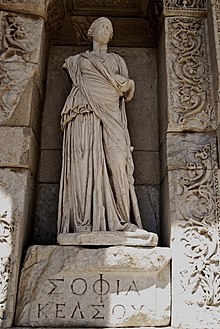Wisdom
![]()
This article is about wisdom as a human ability - for other meanings, see Wisdom (disambiguation).
Wisdom (Old Greek σοφία, Latin sapientia, Hebrew hokhmah) refers primarily to a profound understanding of the interrelationships in nature, life and society, as well as the ability to identify the most coherent and sensible course of action in the face of problems and challenges.
There are several definitions and concepts of wisdom, which usually move in the areas of tension between rationality and intuition, knowledge and faith, and experience and instinct. There is widespread agreement that wisdom is a sign of mental agility and independence: it enables its bearer to systematically understand things.
- to think ("a wise knowledge", "a wise decision", "a wise judgment"),
- to say ("a wise word", "a wise counsel") or
- to do ("a wise behavior"),
that prove to be sustainably meaningful in the given situation. This often happens while avoiding disturbing influences, such as one's own emotional state or social peer pressure. However, on closer examination and comprehensive appreciation of all circumstances, sometimes only at a distance in time or space, these considerations, statements and actions turn out to be "right", accurate or "true". The same applies to words and actions that the wise man does not utter or do after careful consideration (cf. "Si tacuisses, philosophus mansisses"). Wisdom is counted among the cardinal virtues.
As an object, wisdom is thematized by philosophy and theology, the individual religions and ethnology, by the sociology of knowledge and personality psychology, fairy tale and myth research, as well as in its artistic forms through art, literature and music.

Sophia statue in Ephesus
Word Origin
The adjective weise ("knowing, clever, experienced in life") comes from Middle High German wīs, wīse ("understanding, clever, experienced, learned, knowledgeable"), which derives from Old High German wīs, wīsi (8th century) or from Middle Low German and Old Saxon wīs. The Germanic word *weis(s)a- derives from the indexed Indo-European root ueid-, which is related to the sense district wissen. The meaning is probably "knowledgeable with regard to a thing, wise, experienced," as in Old Indian vedas- ("knowledge, insight") or Sanskrit Veda ("knowledge"). Originally, before its change of meaning, this form of the word probably first meant "to see" or "to have seen," as can be seen from the difference between the Latin videre ("to see") and the Greek oida ("to know"). Derived from the German Eigenschaftswort weise is the factitive verb jmd. (unter)weisen ("to show, guide, instruct"). The noun wisdom as a "state of being wise" (Old High German wīsheit) can be traced back to the 9th century. Closely related is the word Gewitztheit in the old meaning "cleverness, shrewdness".
Philosophy
The relationship between philosophy and wisdom becomes an issue where the former actually or supposedly arises from the latter, explicitly distinguishes itself from older or contemporaneous wisdom traditions or, on the other hand, declares itself to be identical with wisdom itself - possibly only in a weakened form as the striving for it as a fundamentally unattainable ideal. The self-designation of philosophy as "friend of wisdom" (philo-sophia) has repeatedly been interpreted programmatically in the history of philosophy and was often the starting point for the determination of its own self-understanding.
While Homer, Pindar or Heraclitus still used sophia in its original meaning as "efficiency in relation to something", this changes in the case of Socrates, who in his disputes with interlocutors who were even particularly excellently efficient in certain respects showed their failure in understanding general questions and who was called the wisest by the Delphic oracle due to his dictum "I know that I know nothing". Socrates' motif of a wisdom that corresponds to the human capacity in contrast to a wisdom that exceeds it and is understood as divine was to determine the philosophical and partly also theological discourse on wisdom in the West.
In Plato's Allegory of the Cave, wisdom refers to a knowledge of the real world by turning away from the deceptions and errors of everyday knowledge, public opinion, and conventional prejudices. The study of the phenomenon of wisdom is what distinguishes philosophers. The focus is on the world of ideas with the idea of the good. Since Plato, wisdom has been one of the four cardinal virtues.
Aristotle, in his Metaphysics, says of wisdom that it is "knowledge of certain principles and causes." (I 1, 982 a 2 - 3). In the sixth book of the Nicomachean Ethics he calls wisdom a virtue of understanding or dianoetic virtue, which refers to the immutable and necessary. He sees it as a combination of the two virtues of understanding, science (episteme) and reason (nous).
The Stoa developed the ideal of the Stoic sage, whose perfect virtue makes him happy in the extreme even under torture.
In Hellenistic Judaism wisdom becomes the central concept of the relationship with God. Wisdom is on the one hand the way in which God works in the world (wisdom of creation) and with which he speaks to people (wisdom of the Torah). Wisdom, on the other hand, is the actual form of man's turning towards God, in pious knowledge of God and virtuous action. It can even be personified, as a female figure who gives advice (Book of Proverbs) or dances before God.
Search within the encyclopedia